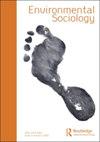Challenging the white spaces of environmental sociology
IF 2.8
Q3 ENVIRONMENTAL STUDIES
引用次数: 5
Abstract
In 2015, Dorceta Taylor received the Fred Buttel Outstanding Contribution to the Field of Environmental Sociology Award at the annual meeting of the American Sociological Association (ASA). At a business meeting that year, Dr. Taylor observed that the ASA Section on Environmental Sociology has remained as white as it was when she first became a member decades ago (Wilder et al. 2019). The following year, the section council placed the topic of ‘diversity’ on the business meeting agenda – but time ran short and the meeting was adjourned without any discussion. In response to the fact that these concerns had been repeatedly raised but not adequately addressed, four of the authors of this essay formed an ad hoc Committee on Racial Equity (CRE). In its first year, the CRE tasked itself with investigating racial and ethnic diversity within the section, assessing the professional climate for scholars of color, and recommending changes in section policies and practices. Our research revealed that although U.S. sociology is more racially diverse than it was in the early 2000s, this pattern does not hold for environmental sociology. In spite of growing overall membership in recent years, the ASA Section on Environmental Sociology has actually lost graduate student and faculty members of color over the last decade (Mascarenhas et al. 2017a). Additionally, we found that among our majority-white survey respondents, there seemed to be little knowledge about the working and learning conditions of faculty and students of color in the section (Mascarenhas et al. 2017b). Moreover, while many white section members expressed support for the work of the CRE, some explicitly or implicitly placed the responsibility on scholars and students of color to insert themselves into the field rather than putting the onus on the field to provide an environment and scholarly community that are more welcoming (Mascarenhas et al. 2017b). We concluded that U.S. environmental sociology remains constituted by multiple forms of ‘white space’ (Mascarenhas et al. 2017a); that is, spaces characterized by the overwhelming presence of whites in everyday interactions and positions of authority, which formally and informally act as barriers to inclusion and belonging for people of color (Anderson 2015). White space can also produce and reproduce ‘tastes, perceptions, feelings, and emotions’ (Bonilla-Silva 2014, 104) on racial dynamics that protect and promote white interests (Bonilla-Silva, Goar, and Embrick 2006). It is clear to the CRE that U.S. environmental sociology being theorized, taught, and experienced as a white space is a phenomenon worthy of our collective scrutiny, as white institutional spaces are not accidental, and they carry epistemic implications (Moore 2007; Murphy 2021).挑战环境社会学的空白
2015年,多塞塔·泰勒在美国社会学协会(ASA)年会上获得弗雷德·巴特尔环境社会学领域杰出贡献奖。在那一年的一次商务会议上,泰勒博士观察到,美国标准协会环境社会学部门仍然像几十年前她第一次成为会员时一样白人(Wilder et al. 2019)。第二年,分会将“多样性”议题列入商务会议议程,但由于时间紧迫,会议没有进行任何讨论就休会了。针对这些问题一再被提出但没有得到充分解决的事实,本文的四位作者成立了一个特设种族平等委员会(CRE)。在第一年,CRE的任务是调查该部门的种族和民族多样性,评估有色人种学者的职业环境,并建议该部门政策和实践的变化。我们的研究表明,尽管美国社会学比21世纪初更具种族多样性,但这种模式并不适用于环境社会学。尽管近年来整体会员人数不断增加,但在过去十年中,ASA环境社会学部门实际上已经失去了有色人种的研究生和教职员工(Mascarenhas et al. 2017a)。此外,我们发现,在我们的大多数白人调查受访者中,似乎对该部门有色人种教师和学生的工作和学习条件知之甚少(Mascarenhas等人,2017b)。此外,虽然许多白人部门成员表示支持CRE的工作,但一些人明确或含蓄地将有色人种学者和学生的责任放在了他们自己进入该领域,而不是将提供一个更受欢迎的环境和学术社区的责任放在了该领域(Mascarenhas et al. 2017b)。我们的结论是,美国环境社会学仍然由多种形式的“空白空间”构成(Mascarenhas et al. 2017a);也就是说,以白人在日常互动和权威职位中压倒性存在为特征的空间,正式和非正式地成为有色人种包容和归属的障碍(Anderson 2015)。在保护和促进白人利益的种族动态(Bonilla-Silva, Goar, and Embrick 2006)方面,空白空间也可以产生和再现“品味、感知、感觉和情绪”(Bonilla-Silva, 2014, 104)。CRE很清楚,美国环境社会学作为一个白色空间被理论化、教授和体验,这是一个值得我们集体审视的现象,因为白色机构空间不是偶然的,它们具有认知意义(Moore 2007;墨菲2021)。
本文章由计算机程序翻译,如有差异,请以英文原文为准。
求助全文
约1分钟内获得全文
求助全文
来源期刊

Environmental Sociology
ENVIRONMENTAL STUDIES-
CiteScore
4.60
自引率
12.00%
发文量
34
期刊介绍:
Environmental Sociology is dedicated to applying and advancing the sociological imagination in relation to a wide variety of environmental challenges, controversies and issues, at every level from the global to local, from ‘world culture’ to diverse local perspectives. As an international, peer-reviewed scholarly journal, Environmental Sociology aims to stretch the conceptual and theoretical boundaries of both environmental and mainstream sociology, to highlight the relevance of sociological research for environmental policy and management, to disseminate the results of sociological research, and to engage in productive dialogue and debate with other disciplines in the social, natural and ecological sciences. Contributions may utilize a variety of theoretical orientations including, but not restricted to: critical theory, cultural sociology, ecofeminism, ecological modernization, environmental justice, organizational sociology, political ecology, political economy, post-colonial studies, risk theory, social psychology, science and technology studies, globalization, world-systems analysis, and so on. Cross- and transdisciplinary contributions are welcome where they demonstrate a novel attempt to understand social-ecological relationships in a manner that engages with the core concerns of sociology in social relationships, institutions, practices and processes. All methodological approaches in the environmental social sciences – qualitative, quantitative, integrative, spatial, policy analysis, etc. – are welcomed. Environmental Sociology welcomes high-quality submissions from scholars around the world.
 求助内容:
求助内容: 应助结果提醒方式:
应助结果提醒方式:


